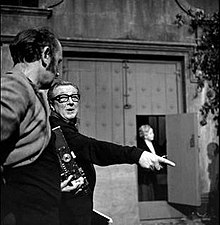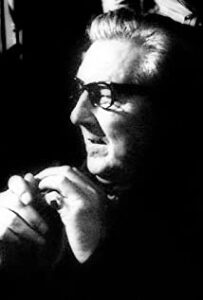The 50 films directed by Terence Fisher
The underrated British film director Terence Fisher (23 February 1904 – 18 June 1980) directed movies from 1948 to 1974, and was best known for his work for Hammer Films, directing 29 films for the company, more than anyone else, including all their biggest and most iconic hits. He nevertheless had a tricky relationship with Hammer, especially with the boss, James Carreras, who temporarily dropped him after the box-office failure of the costly The Phantom of the Opera (1962).
‘Visually speaking,’ Fisher said, ‘I think my films are good and believable, because I have a good visual sense within the frame. I hate what I call tricky shooting, which makes a film look like a long TV commercial.’
Fisher was born in Maida Vale, London, and was raised by his grandmother in a strict Christian Scientist environment. He left school at 16 and served in the Merchant Navy for five years. He broke into the film industry as a clapper boy at Lime Grove Studios in Shepherd’s Bush in 1933 as ‘the oldest clapper boy in the business’ at nearly 30, and did his first work as an assistant editor in 1934, receiving his first editor credit on Tudor Rose (1936) at Gainsborough Pictures.
One day he applied to J Arthur Rank studios to become a film editor and to his astonishment, he was accepted.
At first he directed a series of short, humble black and white second features, beginning with A Song for Tomorrow (1948), followed by such as To the Public Danger (1948). He then graduated to major projects like The Astonished Heart (1950) and So Long at the Fair (1950), moving on to more B films like Blood Orange (1953) and Spaceways (1953).
Fisher’s first feature for Hammer Films is The Last Page (1951) but his big break came in 1956 when, at the age of 52, Hammer asked him to direct The Curse of Frankenstein (1957). He went on to film several classic horror subjects, including Dracula (1958), The Mummy (1959), and The Curse of the Werewolf (1961). His last film for Hammer is his final film after a gap of five years, Frankenstein and the Monster from Hell (1974), a job he got only because its star Peter Cushing insisted on him.
He directed Peter Cushing in 13 films and directed Christopher Lee in 12 films.
After Frankenstein Must Be Destroyed (1969), Fisher sustained injuries in two bad road accidents, followed by lengthy periods of convalescence, which essentially ended his career, though he returned to Hammer for the final time to make his last film Frankenstein and the Monster from Hell (1974).
Terence Fisher battled alcoholism in his later years and died after several years in retirement in June 1980 at the age of 76. His funeral was attended by a mere handful of his former Hammer colleagues.
The 50 films directed by Terence Fisher:
- A Song for Tomorrow (1948)
- Colonel Bogey (1948)
- To the Public Danger (1948)
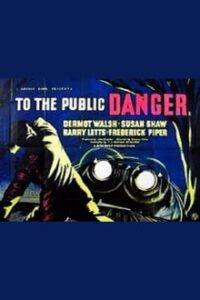
- Portrait from Life (1948)
- Marry Me (1949)
- The Astonished Heart (1950)
- So Long at the Fair (1950)
- Home to Danger (1951)
- The Last Page (1952)
- Wings of Danger (1952)
- Stolen Face (1952)
- Distant Trumpet (1952)
- Mantrap (1953)
- Four Sided Triangle (1953)
- Spaceways (1953)
- Blood Orange (1953)
- Face the Music (1954)
- Murder by Proxy (1954)
- The Stranger Came Home (1954)
- Final Appointment (1954)
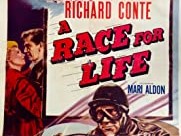
- Mask of Dust (1954)
- Children Galore (1955)
- Stolen Assignment (1955)
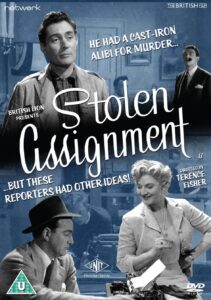
- The Flaw (1955)
- The Gelignite Gang (1956)
- The Last Man to Hang (1956)
- Kill Me Tomorrow (1957)
- The Curse of Frankenstein (1957)
- Dracula (1958)
- The Revenge of Frankenstein (1958)
- The Hound of the Baskervilles (1959)
- The Man Who Could Cheat Death (1959)
- The Mummy (1959)
- The Stranglers of Bombay (1960)
- Brides of Dracula (1960)
- The Two Faces of Dr Jekyll (1960)
- Sword of Sherwood Forest (1960)
- The Curse of the Werewolf (1961)
- The Phantom of the Opera (1962)
- Sherlock Holmes and the Deadly Necklace (1962)
- The Horror of It All (1963)
- The Gorgon (1964)
- The Earth Dies Screaming (1964)
- Dracula: Prince of Darkness (1966)
- Island of Terror (1966)
- Frankenstein Created Woman (1967)
- Night of the Big Heat (1967)
- The Devil Rides Out (1968)
- Frankenstein Must Be Destroyed (1969)
- Frankenstein and the Monster from Hell (1974).

